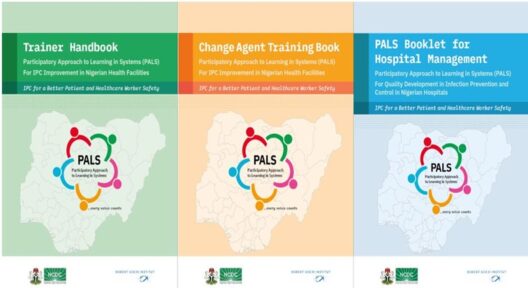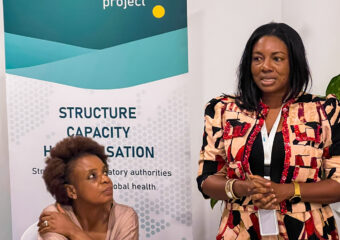Publication of PALS Training Handbooks
The NiCaDe II project published three handbooks as part of their innovative, multimodule Participatory Approach to Learning in Systems training programme in Nigeria.

The Participatory Approach to Learning in Systems (PALS) is an innovative approach that is applied in Nigerian healthcare settings to improve infection prevention and control (IPC) practices. It does so by mobilising, enabling and empowering healthcare workers at the facility level to become Change Agents. The approach recognises IPC improvement not only as a clinical matter that requires biomedical IPC knowledge, but also as a complex social practice of quality development. PALS acknowledges the local conditions and situation of a health facility and its personnel as the starting point of tailored IPC improvement processes of the organisation as a physical as well as a cultural system.
Consequently, the IPC training is meant to deliver technical knowledge and methods of participatory approaches alike to bring IPC knowledge into practice. The training programme builds on both teamwork and communication on equal terms. Therefore, it leverages the experiences of local players and the local conditions in the health facility to address identified challenges. The approach adds a social and systemic organisational lens to the clinical or technical knowledge to make effective implementation possible.
The PALS training approach was implemented in Nigeria as “Training of Trainers” at national and “Training of Change Agents” at state level. The publications “Trainer Handbook” and “Change Agent Training Book” and “PALS Booklet for Hospital Management” are designed to stimulate and help participants of the PALS IPC Training Programme to deepen their understanding of the PALS.
PALS can only be experienced; it cannot be taught
PALS cannot be internalised through reading or teaching alone but must be experienced to question, discuss, and understand it and build the respective skills and attitudes. This manual helps to guide practitioners in this experiential learning process. Also the multimodule training programme follows this approach and is characterised by a specific didactic format.
We hope that others find this concept useful to approach organisational development efforts in health facilities or other settings. In addition, it is our collective wish that it stimulates further participatory project management and teamwork in national and international public health collaboration.
Further information about the project and the PALS approach for training and practice can be found on the project website: nicadeipcpals.gov.ng.



